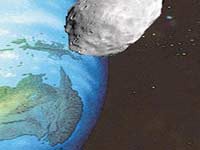Earliest material of solar system yielded from 4.5 billion-year-old meteorite
 A 4.5-billion-year-old meteorite from northwest Africa has yielded one of the earliest minerals of the solar system.
A 4.5-billion-year-old meteorite from northwest Africa has yielded one of the earliest minerals of the solar system.
Officially called krotite, the mineral had never been found in nature before, though it is a human-made constituent of some high-temperature concrete, according to study researcher Anthony Kampf, curator of Mineral Sciences at the Natural History Museum of Los Angeles County.
"This is one that simply was not known in nature until we found it here," Kampf told LiveScience. "That's pretty dramatic."
The meteorite containing krotite is called NWA 1934 CV3 carbonaceous chondrite. Chondrites are primitive meteorites that scientists think were remnants shed from the original building blocks of planets. Most meteorites found on Earth fit into this group, informs.
The mineral is a compound of calcium, aluminum and oxygen, and it needs an estimated temperature of 1500 degrees Celsius to form, which supports the idea that it was created in the early solar system, as the solar nebula condensed and planets started to form, reports.
Subscribe to Pravda.Ru Telegram channel, Facebook, RSS!


